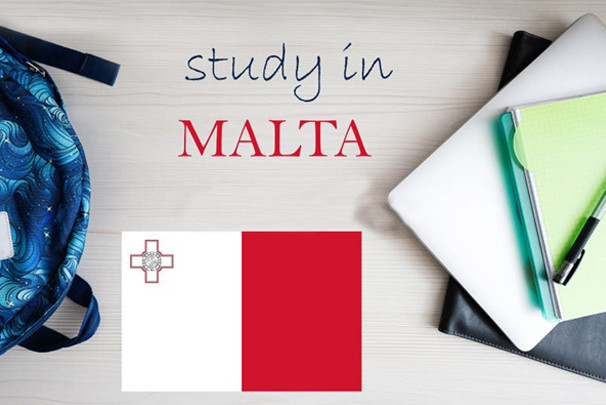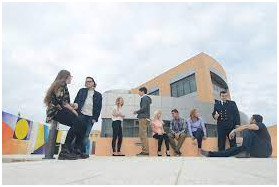Malta is situated in the central Mediterranean Sea, south of Sicily (Italy), Malta forms an archipelago comprising three primary islands: Malta, Gozo, and Comino. The capital city, Valletta, positioned on the main island of Malta, can be located at around 35.8984° N latitude and 14.5144° E longitude. Throughout history, Malta's strategic positioning has been a pivotal factor influencing its cultural, economic, and political growth.
Malta is becoming popular for students, offering a unique mix of excellent education and a lively student scene. Though not exactly like Las Vegas, Malta has exciting features that make it a great option for those looking for an outstanding educational experience.
Malta has a diverse range of entertainment options, similar to the vibrant atmosphere of Las Vegas. There's always something happening, from lively nightlife to cultural events and outdoor activities, creating a lively community among students. Malta's global community brings people from around the world, making the academic experience rich with different cultures. The country's involvement in gaming and technology, along with its historical charm and modern lifestyle, adds a special touch to student life. With a welcoming Mediterranean climate and plenty of networking opportunities, Malta is a standout destination, offering students a memorable and unique journey.
International students find Malta to be a highly desirable study location due to its reputation as one of the safest countries globally. Apart from this, Malta is a great place for students looking for a top-notch education abroad because of its wonderful educational system. Malta's well-respected educational system provides pupils with a wide choice of learning possibilities. In addition, it is one of the most cost-effective study destinations. If we talk about the cost, then the cost of living in Malta varies. Rent for a one-bedroom apartment ranges from €800 to €1,200 monthly, groceries about €200-€300 monthly, and transportation around €26-€35 per month. We are eating out, which costs between €15-€30 per meal.
Regarding education, costs depend on the level and institution. For EU undergraduate students, tuition is €1,000 to €2,500 per year; non-EU students may pay more. Postgraduate programs can cost €6,000 to €10,000 or higher. The last update in January 2022, tuition fees for non-EU students in Malta vary by institution and program. For accurate and up-to-date information, contact the specific university or institution directly. Check with the admissions or international office for details on fees, admission requirements, and potential financial aid.
It is a hub of educational and career opportunities for students. Despite being one of the smallest countries in the world, studying in Malta will be profitable for international students because the degrees earned there are recognized throughout the EU.

Malta's Get Qualified Scheme (GQS):
The Get Qualified Scheme in Malta is crafted to empower individuals to pursue their educational goals. By enrolling in courses sanctioned by the Ministry of Education and Employment, students can benefit from substantial tax credits applied to certain expenses.
Key points about the Get Qualified Scheme in Malta:
Purpose (2022): Motivates individuals to pursue more qualifications via a tax credit initiative.
Goal: Aid personal and professional development through recognized qualifications.
Eligibility: Open to those pursuing eligible courses without prior qualifications at the same level.
Tax Credits: Offers credits for tuition and examination fees, reducing overall income tax liability.
Application: Apply before starting the course, providing details about the chosen institution and program.
Approved Courses: Only recognizes courses from established institutions.
Changes: Tax regulations may change;
This program serves as valuable financial assistance for people handling the expenses linked to advancing their education. Here are more details to help grasp how it works:
- The tax credit is a one-time payment given when you finish the course and gain the approved qualification.
- This credit is used to lessen the amount you owe for annual income taxes. If what you owe is less than the tax credit, you won't get a refund for the remaining amount.
- Both residents of Malta and those from outside Malta can benefit from this tax credit.

Important factors to study in Malta
It is an English Speaking country:
Maltese and English are the two official languages of Malta. The vast majority of the residents speak English fluently. As a result, foreign students' education in Malta is made easier.
Low Cost of Living:
Malta has comparatively cheap living expenses when compared to other European nations. Malta has a monthly average cost of living of €1010 ($1210). Living in Malta as a non-EU student costs around €300-€700 monthly for accommodation, with utilities at €50-€100. For students outside the EU, education costs in Malta vary. Tuition fees depend on the specific program and institution. It's important to check with the university or with Scholarshipkart counselors for accurate information on fees, potential scholarships, and other financial details.
Since rent is seen as a separate expense, it is not included in this. One of the main benefits of studying in Malta is the low cost of living.
Free healthcare for international students:
Malta is well known for offering free medical treatment to students from other countries. Malta offers conveniently accessible and highly high-quality healthcare services. The cost of personal medical treatment is typically far lower than that of other European countries and the United States. Malta offers free public healthcare services for the most part.
Good job Opportunities:
For Indian students wishing to study in Malta, there are plenty of fantastic options in addition to the country's high educational standards. Up to 20 hours a week can be worked part-time by international students. International students are permitted to work full- or part-time. More students wish to study in Malta as a result.

Let’s read about Part-time and full-time employment for students:
Part-time jobs in Malta for students are like part-time work anywhere else. It means working fewer hours than a full-time job, usually around 20 hours a week. This helps students balance work and studies. Part-time jobs in Malta are often flexible, letting students gain work experience, earn money, and still focus on school.
Full-time jobs, on the other hand, require a bigger time commitment - about 40 hours a week. These are better for people who have finished studying or have long breaks. Full-time jobs provide a steady income but can be challenging for students to manage both work and school at the same time.
To sum it up, part-time jobs offer flexibility for students, allowing them to handle work and studies, while full-time jobs are more intense and better for those done with education or during long breaks. Students should find the right balance for their academic and personal needs.
The top courses in Malta are:
Information Technology:
On Malta's Information Technology (IT) sector. Malta provides a stimulating environment for progress and discovery. The faculty is always abreast of the latest developments, and the curriculum has been meticulously refined to satisfy industrial expectations.
Hospitality Management:
Malta offers attractive opportunities for Indian students seeking hotel management degrees due to its expanding tourism industry. Organizations the Institute of Tourism Studies Malta provide extensive curricula that integrate classroom instruction with real-world application, preparing students for a wide range of professions in the hospitality industry.
Business Administration:
Malta is a great place for aspiring business professionals to work because of its advantageous location and vibrant business climate. Modern curricula that include subjects like marketing, finance, and international business can be beneficial to Indian students who are keen to pursue business administration.
Finance and Economics:
There is a need for qualified individuals who are fluent in finance and economics due to Malta's thriving financial services industry. Indian students who are interested in this field may want to take courses that provide knowledge of financial legislation, investment management, and international banking.
Health and Social care:
Students who complete a health and social care program in Malta can improve their problem-solving and communication abilities, which are especially useful in this profession. One skill that is frequently highlighted and helps students in their daily lives is empathy.
For Indian students, going to study in Malta could be a once-in-a-lifetime opportunity that offers them exposure to a diverse cultural environment in addition to academic achievement.
To get the latest and detailed information about studying in Malta,
Book your free consultation with Scholarshipkart now!!